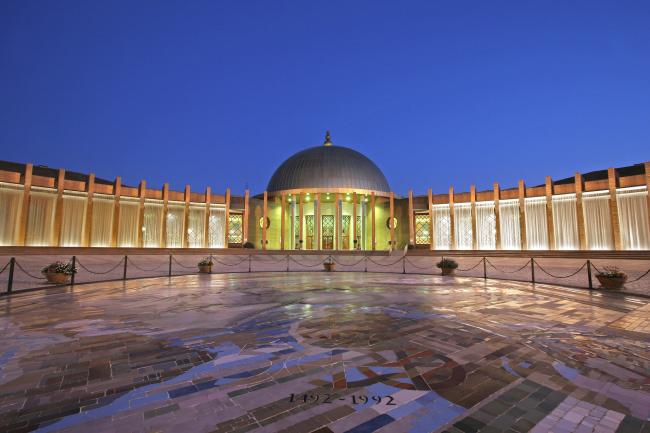
Today, November 16, the Latin Grammys will take place outside of the United States for the first time ever since its debut in 2000. The awards show is happening in Sevilla, an Andalusian city in southern Spain, an unsuspected choice given its colonial connection to Latinx people. Fans and critics alike have criticized and questioned the decision to host the event in Spain instead of a country in Latin America or the Caribbean, the regions credited for the creation of Latin music.
While the Latin Recording Academy includes artists not only from Latin America but from Hispanic and Lusophone-dominant countries, including Spain and Portugal, the move is considered upsetting in part because there is little talk about Sevilla’s historical role in the colonization of Latin America or the Latinophobia rampant throughout Spain.
The other odd detail of this partnership is Sevilla’s commitment to give €19 million to the Latin Recording Academy in order to host the event, part of a three-year deal that involves the promotion of music programming in the region. In return, Sevilla anticipates earning over $500 million in profit. Once the primary port linked to the Americas at the start of its colonization, Sevilla will benefit from Latinx artists and talent centuries later in a climate permeated by a sense of superiority and racist attitudes towards Latinxs.
Spanish artists like Enrique Iglesias, who has won 11 awards, and singers who are nominated this year such as Pablo Alborán, Alejandro Sanz, and Rosalia have also benefited from Latinidad, but they themselves don’t fully acknowledge their role in this complicity. Rosalia’s statement in a 2019 Billboard interview for “Growing Up Latino,” claiming, “she feels like a Latina,” gives a sense of the type of objectification and lack of awareness Spaniards have towards Latinxs. As a Puerto Rican, I myself experienced this type of objectification and my share of outright racism in Madrid where I recently lived for over a year.

Sevilla’s Gains
Back in the 15th century, when Columbus arrived in the Caribbean mistakenly thinking he was in Asia, Sevilla was selected to be the headquarters through which trade would move. Sevilla at the time was a struggling city after having fought a protracted war with the Moors for the land and its expulsion of the Jews. The exploitation of the Americas for at least 200 years greatly benefitted the city economically—before the Spanish government transferred its Americas trade to the port of Cádiz in the 18th century— playing a big hand in developing the city into the fourth biggest city in Spain today. In today’s dollars, the total amount of money made from the Spanish treasure fleets, or West Indies fleet, is $530 billion.
If it weren’t for the extraction of natural resources like the mining for gold in the Cauca Valley mines in Colombia or silver in Potosí, Bolivia, not to mention Spain’s role in pioneering the transatlantic slave trade, Sevilla wouldn’t be what it has grown to be. Today Sevilla has the highest GDP in Andalusia, although the region as a whole has the lowest national GDP. (Madrid that has the highest). In a continuous need to maintain the city and stream money into its economy, tourism has become one of the city’s main sources of income, in part by endeavoring to become a competitive music city by hosting major festivals like Primavera and Sonar.
According to an LA Times interview earlier this year with Latin Recording Academy CEO Manuel Abud, the Andalusian government will give the Latin Grammys an equivalent of €19 million in the span of three years from 2023 to 2025. The estimated profit is a whopping €500 million or $530 million.
Sevilla’s portfolio will get exceedingly boosted, a contemporary case of Latinx people and innovation contributing to the city’s economic growth. Latinx artists, who represent a variety of countries from the Americas, are being used in a very overt way. These artists, who create some of the most creative and original sounds of our time, include but are not limited to Latin pop singers such as Paula Arenas, Shakira, and Camilo; reggaetoneros Karol G and Maluma from Colombia and Bad Bunny from Puerto Rico; Mexican pop-rock, jazz, and folk singer Natalia Lafourcade; Venezuelan pop-rock artist Lasso and salsa-pop singers Marc Anthony and Ricky Martin.

Latin Americans and Racism in Spain
The Spanish colonization of the Americas was based on the idea that its people were savages and a “more advanced” civilization like that of the Spanish needed to save them through Christianity and other forms of violent dispossession.
Latinxs began migrating in large numbers to Spain in the late 1990s. In 2022, 43 percent of all foreign-born residents in Spain were from Central and South America. Though there are several major languages spoken in Spain, Spanish is the official language throughout the country, and this plays a role in making the country attractive to Latinxs. Furthermore, Spain has a naturalization law that allows anyone whose country of origin was colonized by Spain to have the right to Spanish nationality after living in the country legally for two years.
The accelerating rise of Spanish nationalism—a reawakened monster from the Francisco Franco era, a violent 35-year dictatorship that embraced and fostered the idea of a total and pure Hispanic identity—has left Latinx people exposed to institutional racism as well as daily transgressions of discrimination.
As far back as 2006, NACLA wrote about ultra-right-wing and racist groups who coordinated attacks on Latinx and other migrants in public spaces like the subway, reporting that “a young Ecuadorian girl on the Barcelona metro was kicked in the face.” A CGTN America video from 2017 discusses the lack of political power Latinxs hold in the Spanish government due to strategies developed to keep them out of office. For example, people in Spain vote for a party instead of a candidate. There is a list of candidates where Latinxs are usually included at the bottom thus by the time they are called, all the seats are filled. In 2018, El Pais interviewed Spanish-born Latinx who were either bullied in school or sexually assaulted due to their identity. Reuters reported in 2021 that discrimination against other racial and ethnic groups has worsened, notably in areas like housing and education. Latinx students who are from countries outside Latin America, like the United States, have experienced similar offenses.
In 2022, Ashely Gavilanes, 30, a Colombian-Ecuadorian American from New York moved to Catalunya to study travel journalism. She expected to be surrounded by an open-minded group of peers and professors, but instead found the opposite. “I had a professor that talked about antisemitic tropes without considering that someone in the class was Jewish, which there were,” she said.
“Another time in a group project, we had a mixed [racial] group and the discussion of what Spanish we will use was brought up, with some people saying that the Spanish in Spain is the most neutral,” she recalled. “There was a comment about Latinizing something [as] being either negative or bad.”
Flavia Cornejo Vargas, 31, a Peruvian-American from New Jersey, lived in Barcelona for three years from 2019 to 2022 but left due to visa issues. “In Spain it was more backhanded things,” she said. She couldn’t shake off the impression that Spanish people felt they were better than those from Latin America. “When I would say a word [in Spanish] that isn’t used or is used differently [in Spain], they would say that it wasn’t right or I wasn’t speaking the right Spanish,” Cornejo added.
Cornejo Vargas was singled out for not wearing a mask when she was out and about in the Passeig de Gràcia, surrounded by others who were also mostly unmasked. The sole non-white passing person in the crowd, she was the only one asked to wear a mask.
I had a similar mask experience as Cornejo Vargas when I lived in Madrid from 2021 to 2023. On the metro in Madrid, I was screamed at, cursed out, and coughed on by a middle-aged Spanish woman for not wearing a mask, who told me, “You probably can do that in your country, but you can’t do that there,” even though others around us weren’t masked either. My cousin and I were once denied service at a restaurant with the staff claiming they had no seats available despite the place being empty. In Córdoba, I was insulted and bullied by an older Spanish woman along with her friend because they thought I skipped ahead of them in line at Zara.
A month before I decided to move back to New York in April, I was severely harassed by three policemen while I was in the process of getting my fingerprints done for a visa at a police station in Madrid. The officers activated a gag law on me simply because I responded to a policeman when he told me something. The gag law is a 2015 policy passed by the conservative Popular Party government to control protestors. Anyone who “talks back to the police” can be punished for doing so and/or fined up to €600,000.
Finally, the day I was flying out from Madrid, I was cursed at, body shamed, and gaslit by a Spanish woman who thought I was skipping the elevator line at the airport. After the woman left, I cried on the shoulders of another Latina who witnessed the whole event.
The Latin Grammys
Logistically, the move to Europe is illogical due to the time difference between Sevilla and cities like Los Angeles, nine hours ahead, and New York and Miami, six hours ahead. Why the Latin Recording Academy didn’t decide to choose a major Latin American city is unclear, but the idea of the CEO, who is Mexican-American and born in Mexico City, choosing a large Latin American metropolitan city like Mexico City to host its first voyage outside the United States would have made a more holistic match both historically and culturally.
This illogical reasoning has also played out in this year’s nominations. Like 2019, when few reggaeton artists were nominated even though it was a big year for the genre, the Latin Grammys this year has excluded corrido tumbados, Mexican regional music, from nominations even though it’s been a big year for the genre. Peso Pluma, one of the biggest corrido artists, along with Rancho Humilde and Fuerza Regida were not nominated, with the exception of Conexión Divina for Best New Artist. Yet the usual Hispanophone recurring suspects such as Pablo Alborán, Rosalía, and Alejandra Sanz are all nominated for Record of The Year. Pablo Alborán is also nominated for Album of The Year and Song of The Year, and Pablo Alborán, Manuel Carrasco, and Vanesa Martín for Best Pop Vocal Album.
The problem isn’t only about the new location, but also who is and isn’t being nominated and given recognition when it comes to Latin music.
Damaly Gonzalez is a Brooklynite, Williamsburg-native of Puerto Rican descent that goes by she/her/hers. She is a freelance identity and culture writer who writes ideas, opinion, and analytical pieces by using stories of everyday life experiences in order to invoke deep conversations and conscious minds. She has been published in Rolling Stone, Nonprofit Quarterly, ARTNews, Next Avenue, The Latinx Project at NYU, NACLA, and others. Follow her on Instagram and Twitter @damalywrites.

